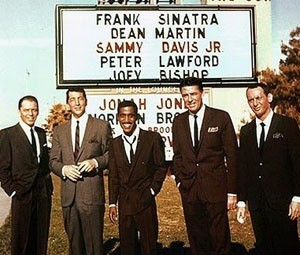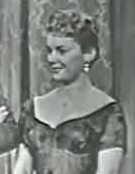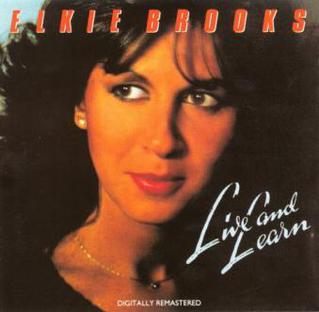
The Rat Pack was an informal group of singers that, in its second iteration, ultimately made films and appeared together in Las Vegas casino venues. They originated in the late 1940s and early 1950s as a group of A-list show business friends, such as Errol Flynn, Nat King Cole, Mickey Rooney, Judy Garland, Frank Sinatra and others who met casually at the Holmby Hills home of Humphrey Bogart and Lauren Bacall. In the 1960s, the group featured Sinatra, Dean Martin, Sammy Davis Jr., Joey Bishop, and Peter Lawford, among others. They appeared together on stage and in films in the 1950s and 1960s, including the films Ocean's 11 and Sergeants 3; after Lawford's expulsion, they filmed Robin and the 7 Hoods with Bing Crosby in what was to have been Lawford's role. Sinatra, Martin, and Davis were regarded as the group's lead members after Bogart's death.

Samuel George Davis Jr. was an American singer, actor, comedian and dancer.

A Chorus Line is a 1975 musical with music by Marvin Hamlisch, lyrics by Edward Kleban, and a book by James Kirkwood Jr. and Nicholas Dante.

Elvera "Baby" Sanchez Davis was an American dancer and the mother of Sammy Davis Jr.

The Will Mastin Trio was a troupe of dancers and singers formed by Will Mastin, Sammy Davis Sr., and Sammy Davis Jr. The original members were Sammy Davis Sr., Howard M. Colbert Jr., and Will Mastin, although Sammy Davis Jr. would join them on stage when he was a little boy. Howard M. Colbert Jr. was the tap-dance teacher of Sammy Davis Jr., who treated him much as an uncle. Colbert left the Trio in December 1941 to join the United States Army when the United States declared war on Germany during World War II. Sammy Davis Jr. was 16 years old at this time and became part of the main vaudeville act, replacing Colbert.
"And This Is My Beloved" is a popular song from the 1953 musical Kismet, credited to Robert Wright and George Forrest. Like most other music in the show, this melody was based on music composed by Alexander Borodin, in this case the nocturne from the third movement of Borodin's String Quartet No. 2 in D.

Stop the World – I Want to Get Off is a 1961 musical with a book, music, and lyrics by Leslie Bricusse and Anthony Newley. In 1966 Warner Bros. released a film adaptation of the play. In 1996, a film version was produced for TV, made for the A&E Network.

Frederick O'Neal was an American actor, theater producer and television director. He founded the American Negro Theater, the British Negro Theatre, and was the first African-American president of the Actors' Equity Association. He was also known for his work behind the scenes as a revolutionary trade unionist.

Peggy King is an American jazz singer. She was a member of big bands led by Charlie Spivak, Ralph Flanagan, and Ray Anthony.

Live and Learn is an album by Elkie Brooks, released in 1979.

Golden Boy is a 1964 musical with a book by Clifford Odets and William Gibson, lyrics by Lee Adams, and music by Charles Strouse.

Golden Rainbow is a Broadway musical that opened in 1968. It starred Steve Lawrence and Eydie Gormé until it closed in early 1969.

Miller Theater, originally the Sam S. Shubert Theatre and later, the Merriam Theater, is Philadelphia's most continuous location for touring Broadway shows. It is located at 250 South Broad Street within the Avenue of the Arts cultural district of Center City Philadelphia. The Theatre was built by The Shubert Organization in 1918.

Melinda Sullivan is an American dancer, choreographer and actress. She is known for her work on the U.S. version of So You Think You Can Dance, where she was a finalist in the television series' seventh season, and as the 2012 winner of the Capezio A.C.E. Award. That entry, "Gone", debuted in expanded form in New York in August 2013.
Burt Boyar was a Broadway columnist, voice actor, and author. He voiced the title character of Archie Andrews for NBC Radio in 1945 and co-wrote Yes I Can: The Story of Sammy Davis, Jr. with wife Jane Boyar and Davis himself.

Make It Snappy was a musical revue that ran for 96 performances at the Winter Garden Theatre in the 1922–23 Broadway season. It ran from 13 April to 1 July 1922. It starred Eddie Cantor, who introduced the hit songs "Yes! We Have No Bananas" and "The Sheik of Araby".

George Arthur Rhodes was an American arranger, conductor, music director, pianist, and composer. He is most known for being Sammy Davis Jr.'s long-time music director, arranger, and conductor. Rhodes made history as a black music director by being the first to work for a major network and to work for a Las Vegas showroom. After being hired as a temporary pianist for Davis in 1955, Rhodes eventually became his principal arranger and conductor, working on his variety act, The Sammy Davis Jr. Show, three of Davis' television specials, two musicals starring Davis, and three albums.
Frances Taylor Davis was an American dancer and actress who was a member of the Katherine Dunham Company, and the first African American ballerina to perform with the Paris Opera Ballet.
Broadway Answers Selma was a fundraising benefit concert held at the Majestic Theatre on Broadway on 4 April 1965. It was held to raise funds for the civil rights movement in the aftermath of the Selma to Montgomery marches.

The Elmwood Casino, once known as the "Showspot of Canada," was a nightclub situated on Dougall Avenue in Windsor, Ontario. It was located not far from Detroit, just across the Detroit River.













